

Berlin Wall. Satellite image of Berlin, with the wall's location marked in yellow West and East Berlin borders overlaying a current road map (interactive map) The Berlin Wall (German: Berliner Mauer) was a barrier constructed by the German Democratic Republic (GDR, East Germany) starting on 13 August 1961, that completely cut off (by land) West Berlin from surrounding East Germany and from East Berlin.[1] The barrier included guard towers placed along large concrete walls,[2] which circumscribed a wide area (later known as the "death strip") that contained anti-vehicle trenches, "fakir beds" and other defenses.
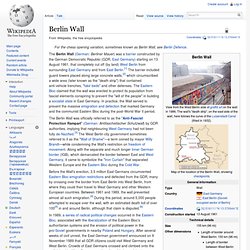
Perestroika. Perestroika (Russian: перестро́йка, IPA: [pʲɪrʲɪˈstrojkə] ( ))[1] was a political movement for reformation within the Communist Party of the Soviet Union during the 1980s (1986), widely associated with Soviet leader Mikhail Gorbachev and his glasnost (meaning "openness") policy reform.
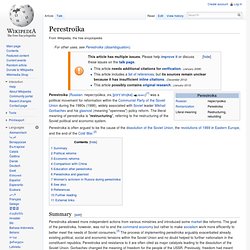
The literal meaning of perestroika is "restructuring", referring to the restructuring of the Soviet political and economic system. Perestroika is often argued to be the cause of the dissolution of the Soviet Union, the revolutions of 1989 in Eastern Europe, and the end of the Cold War.[2] Summary[edit] Political reforms[edit] Gorbachev increasingly found himself caught between criticism by conservatives who wanted to stop reform and liberals who wanted to accelerate it. Despite some setbacks, he continued his policy of demokratizatsiya, and he enjoyed his worldwide perception as the reformer. Meaningful changes also occurred in governmental structures. Economic reforms[edit] Perestroika postage stamp, 1988. Glasnost. Glasnost (Russian: гла́сность, IPA: [ˈɡlasnəsʲtʲ] ( The word was frequently used by Gorbachev to specify the policies he believed might help reduce the corruption at the top of the Communist Party and the Soviet government and moderate the abuse of administrative power in the Central Committee.
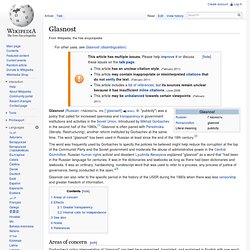
Russian human rights activist and dissident Lyudmila Alexeyeva explained "glasnost" as a word that "had been in the Russian language for centuries. It was in the dictionaries and lawbooks as long as there had been dictionaries and lawbooks. It was an ordinary, hardworking, nondescript word that was used to refer to a process, any process of justice of governance, being conducted in the open. Tear down this wall! "Tear down this wall!
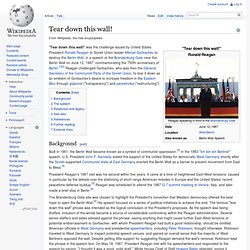
" was the challenge issued by United States President Ronald Reagan to Soviet Union leader Mikhail Gorbachev to destroy the Berlin Wall, in a speech at the Brandenburg Gate near the Berlin Wall on June 12, 1987, commemorating the 750th anniversary of Berlin.[1][2] Reagan challenged Gorbachev, who was then the General Secretary of the Communist Party of the Soviet Union, to tear it down as an emblem of Gorbachev's desire to increase freedom in the Eastern Bloc through glasnost ("transparency") and perestroika ("restructuring").
Background[edit] Built in 1961, the Berlin Wall became known as a symbol of communist oppression.[3] In the 1963 "Ich bin ein Berliner" speech, U.S. President John F. Ich bin ein Berliner. Coordinates: "Ich bin ein Berliner" (German pronunciation: [ˈʔɪç ˈbɪn ʔaɪn bɛɐˈliːnɐ], "I am a Berliner") is a quotation from a June 26, 1963, speech by U.S.
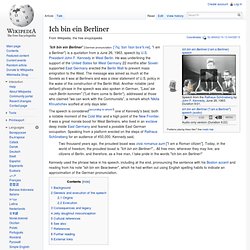
President John F. Kennedy in West Berlin. Berlin Wall. Satellite image of Berlin, with the wall's location marked in yellow West and East Berlin borders overlaying a current road map (interactive map) The Berlin Wall (German: Berliner Mauer) was a barrier constructed by the German Democratic Republic (GDR, East Germany) starting on 13 August 1961, that completely cut off (by land) West Berlin from surrounding East Germany and from East Berlin.[1] The barrier included guard towers placed along large concrete walls,[2] which circumscribed a wide area (later known as the "death strip") that contained anti-vehicle trenches, "fakir beds" and other defenses.
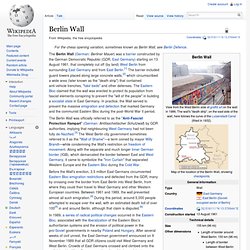
Berlin Blockade. The Berlin blockade (24 June 1948 – 12 May 1949) was one of the first major international crises of the Cold War.
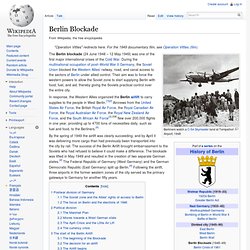
During the multinational occupation of post–World War II Germany, the Soviet Union blocked the Western Allies' railway, road, and canal access to the sectors of Berlin under allied control. Their aim was to force the western powers to allow the Soviet zone to start supplying Berlin with food, fuel, and aid, thereby giving the Soviets practical control over the entire city.